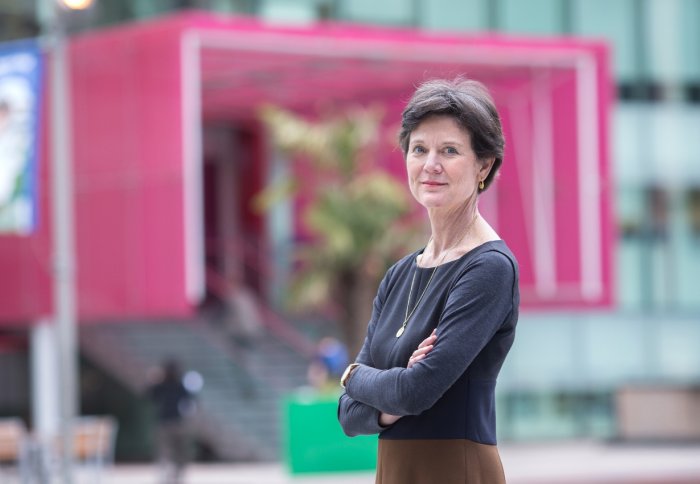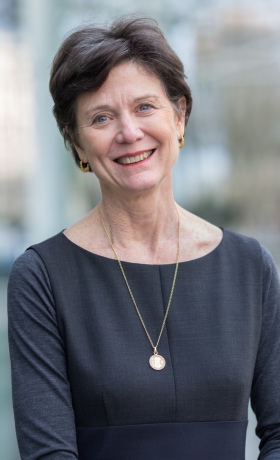Profile: Sarah Porter Waterbury, Imperial's first Vice President of Advancement

Sarah talks about establishing relationships, the diverse impact of giving and the important trans-Atlantic differences in philanthropy.
To an outsider, advancement and philanthropy can seem rather enigmatic and shrouded in mystique – a sort of dark arts in the higher education sector. How exactly are individuals and organisations persuaded to give - sometimes great sums - to universities, and how are deals mutually reached?
That’s one of the main questions I wanted to explore when meeting Sarah – who has an exemplary track record in this area, at the American University in Beirut and most recently New York University. Perhaps there’s a secret recipe or formula?
 It quickly becomes clear, though, from Sarah’s answers and the questions she raises, that it’s less about persuasion and more about building good relationships and sharing the excitement and the wonder.
It quickly becomes clear, though, from Sarah’s answers and the questions she raises, that it’s less about persuasion and more about building good relationships and sharing the excitement and the wonder.
“People are people, the world over,” says Sarah who has worked in Latin America, the Middle East and the US. “And people like to give to people. Donors need to feel very comfortable with us, and need to believe that we will act responsibly and use their gift appropriately and in accordance with their wishes. That’s all about trust. And that’s why it can take time. As you get to know someone well you can begin to see how they might like to have an impact, what matters to them, and you can then make suggestions and develop ideas that resonate personally and perhaps deeply."
The first priority for Sarah, though, will be building relationships internally, by getting to know members of the Imperial community – including staff across the departments and student groups too. Sarah sees that as absolutely essentially in establishing the foundations from which to work. It taps into more fundamental point about what advancement is actually all about.
“Ultimately we’re trying to showcase the university to the right audiences, whether it’s people or organisations that can help us with our financial and resource needs or recommend us to prospective staff and students and tell them what a great place it is to work and study.”
Impact of giving
For Sarah, job satisfaction comes in a large part from seeing the impact that advancement activities and gifts can have – both on the recipient institution and the donor themselves.
She’s especially keen to point out how impact is distributed across different levels. For example, at one end of the scale, £5,000 could transform the life of a student who might otherwise not have been able to come to an institution like Imperial because he or she is missing £5,000 in their accommodation budget. Moving up, £50,000 could invigorate the work of a professor; £500,000 might transform a department allowing it to pursue new initiatives; £5 million might transform a Faculty, enabling it to buy much needed equipment, or renovate old lab space; and £50 million could transform the university perhaps by building entirely new facilities, or securing financial resources through the establishment of an endowment. And there are many more examples, but at each level the impact of the gift on the recipient is profound.
“I love seeing that [generous] side of human nature; it’s always inspiring"
– Sarah Porter Waterbury
VP Advancement
On the other side of the coin, the impact on a donor who has taken that decision to give can be just as profound Sarah says.
“They are always pleased and proud to see what they have been able to do. It deepens their connection to the institution and they begin to feel more engaged in the mission and the work of this great place. Often, more often than not, donors feel deeply grateful for the opportunity to be a part of what we do. They see that a place like Imperial is having a lasting impact on society and they are truly delighted to be a member of the community through their giving.
“I love seeing that side of human nature; it’s always inspiring"
A new way of thinking
As Vice President of Advancement, Sarah and her team of senior managers will be responsible for all aspects of fundraising as well as alumni relations and events. Sarah is aware that she has a lot to learn about how giving to higher education is viewed in the UK.
"I’m under the impression that in the UK, people are accustomed to seeing the government as the principal supporter of higher education and may not feel a personal responsibility in ensuring that Britain’s fantastic, world-renowned universities continue to operate at a high level,” says Sarah.
“By contrast, in the US, everybody understands that universities need philanthropic support – both the private and the public universities. Some of the very large prestigious state schools in the US are only receiving 17% of their funding from government sources. People also know that to compete effectively universities need to attract the very brightest students and that many of those students will not have the resources to pay tuition. So people are often are willing to provide funds for scholarships. In fact often families of means will pay for their own child and then pay for another child at the same time. It’s just wonderful to see that kind of generosity."
Sarah has already been in touch with development colleagues in the UK at other large universities and some of the great museums and cultural institutions and she’s delighted to see the important work happening in philanthropy all over. “It’s a great group and I know I’m going to learn a lot about UK philanthropy and hopefully make my own mark.”
Three facts about Sarah
-
1. As a teenager she was a competitive swimmer, specialising in sprint backstroke, and has retained a hint of that killer instinct. “Get me near a pool and I still want to win, whatever it is!” These days though it’s more about preserving mental wellbeing – “it takes me away from everything”. She’ll be looking forward to morning swims at Ethos and possibly London’s Olympic Pool.
-
2. Studying a BA in History at Princeton University she specialised in Latin American History and specifically the impact of colonial powers on the ancient native civilisations. She’s a fan of the popular history and historical fiction genres, with Hilary Mantel’s Wolf Hall a favourite. “It’s such a different perspective; you’re get really inside [Cromwell’s] head.
-
3. She and her husband are both keen birdwatchers and try to arrange a big birding trip every other year, the most recent being to Tanzania. “We’re excited to head out to the British country side and spend some time getting to know the birds here!”
Article text (excluding photos or graphics) © Imperial College London.
Photos and graphics subject to third party copyright used with permission or © Imperial College London.
Reporter
Andrew Czyzewski
Communications Division